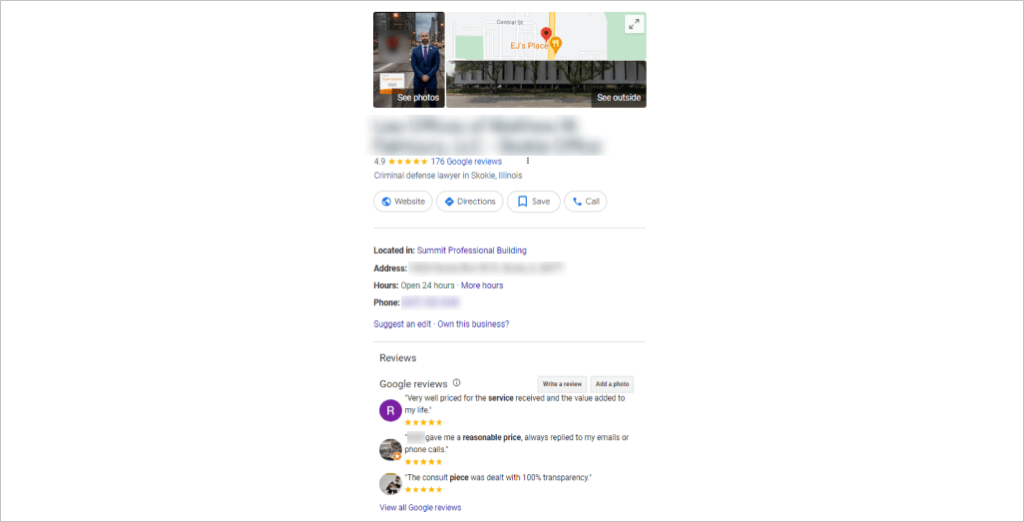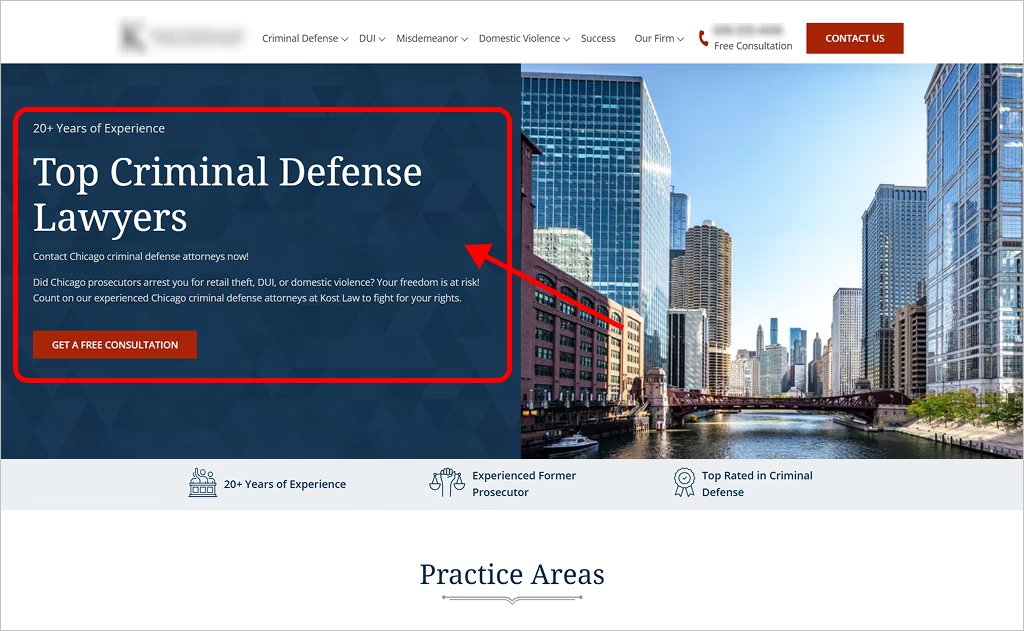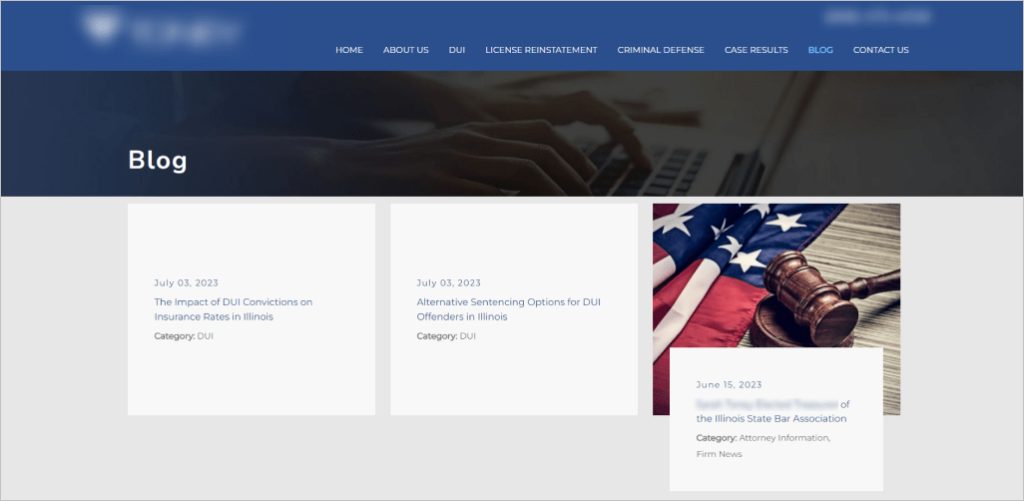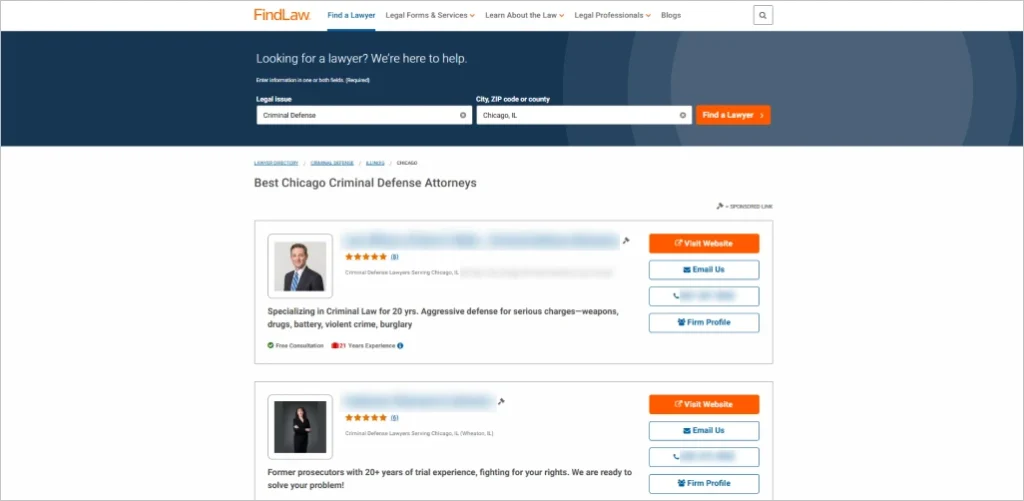There are over 250,000 criminal defense lawyers in the U.S., and in 2026, there is a fierce battle for a limited pool of leads.
So, how do you get to them first? Reverse engineer it! Start where your clients start: online.
We know that 96% of people seeking legal help start online, and 75% never scroll past page one of Google.
Therefore, page one is precisely where you need to be. And you can get there with the help of SEO (search engine optimization).
Ready to see how far you go? Keep scrolling.

Key Takeaways
- SEO helps your firm get found first when clients search for legal help online.
- Local visibility beats national reach; dominate your market first.
- Publish clear, helpful content to build authority with your prospects and Google.
- A fast, mobile-friendly site and strong reviews are vital for your pipeline.
- SEO delivers lasting ROI that keeps paying off long after your ads stop running.
- Prepare for the new wave of “search engines” like ChatGPT, and get featured in AI-powered results.
What Is Criminal Defense SEO
Criminal defense SEO is the process of making your law firm website easier to find on Google and other search engines.
When someone searches for “DUI lawyer near me” or “criminal defense attorney in Chicago,” SEO ensures your website appears at the top of the deck!

It’s not magic. By improving your site’s content, speed, and reputation, you’re signaling to Google, “Hey, I’m the lawyer they’re looking for.”
And if Google agrees, your criminal defense firm will pop up first on the search page, attract way more leads, and be one step ahead of every competitor in your city.
Why Is Criminal Defense SEO Marketing for Lawyers Important?
When someone is charged with a crime, one of their first moves is to look online for help.
If your criminal law practice isn’t on page one, they’ll never find you. Remember, 75% of users never scroll past the first page.
But SEO goes beyond ranking well; it helps you gain trust. Google loves websites that show real Experience, Expertise, Authoritativeness, and Trustworthiness (E-E-A-T).
Without it, your criminal defense practice simply won’t appear in competitive searches.
And remember, you lose ground when you neglect your SEO. Studies show businesses drop 10–20% in visibility annually when they stop optimizing.
Here’s what happens for lawyers who do invest:
- Appear where clients are searching.
- Inspire trust before the first call.
- Gain massive exposure and achieve consistent case growth.
Top 13 Criminal Defense Lawyer SEO Strategies
You’ve read the theory. You’ve seen the proof. Now, let’s talk strategy!
These are the top 13 SEO for criminal defense lawyers tips to elevate your chances of reaching the first page of Google. At the end of his maze lies a stronger, steadier caseload. Let’s go!
1. Set Up and Optimize Your Google Business Profile
Let’s start with something simple (and free) that most lawyers overlook: your Google Business Profile (formerly Google My Business).
It’s the little box that pops up on the right-hand side of Google search with photos, reviews, directions, and a “Call Now” button.
Your GBP also appears on Google Maps and in the Local Pack — i.e., those top three listings that grab the most clicks for “criminal defense lawyer near me.”
Here’s how to make your GBP work for you:
- Claim your profile and verify your criminal law firm.
- Complete every field — hours, address, phone, your law firm’s website, and services.
- Add photos of your team, office, and logo (they inspire warmth and trust).
- Pick the right categories, like Criminal Justice Attorney or DUI Lawyer.
- Post weekly — share updates, FAQs, or client success stories.

Remember, 64% of your prospects use your Google Business Profile to find contact info or directions. If yours isn’t optimized, you’re giving those leads to your competitors.
2. Build a Criminal Defense SEO-Friendly Website
First impressions happen in the blink of an eye.
Your website is often a client’s first impression of your firm. And they’re impatient!
53% of mobile users click away if a page takes more than 3 seconds to load, and conversion rates drop 4.4% for every extra second.
To make sure this doesn’t happen to you, add this to your SEO efforts:
- Keep your site fast, secure (HTTPS), and mobile-friendly.
- Use clear navigation by case type (DUI, drug charges, assault).
- Add visible calls to action like “Request a Free Consultation.”
Your criminal defense website is home base. It keeps those consultations flowing day in and day out… even if you’re not actively running ads!
Make sure your website is up to snuff or nothing you read below will matter.
3. Research and Target the Right Keywords
Ranking is great… but what are you ranking for?
Keyword research answers that critical question. You can pinpoint exactly what your potential clients are typing into Google.
Use tools like Ahrefs, Google Keyword Planner, or SEMrush to uncover both broad legal terms and specific case-related searches your prospects use.
For example:
- “Criminal defense lawyer near me” = ready to hire.
- “What happens after a DUI arrest?” = still researching, but a future client.
Focus on both — one brings fast leads, the other builds long-term visibility.
Smart keyword targeting also helps you spot hidden opportunities, like “first-time offender lawyer” or “affordable criminal attorney in [city].”
These lower-competition phrases often bring higher-quality leads and help your legal services attract people ready to act.
| Top 25 Criminal Defense Lawyer SEO Keywords | ||
|---|---|---|
| # | Keyword | Monthly Volume (US) |
| 1 | criminal defense attorney | 34,000 |
| 2 | criminal defense lawyer | 31,100 |
| 3 | dui lawyer | 20,000 |
| 4 | criminal lawyer | 18,000 |
| 5 | dui attorney | 16,000 |
| 6 | criminal attorney | 8,700 |
| 7 | felony attorney | 7,900 |
| 8 | dui lawyer near me | 7,800 |
| 9 | criminal lawyer near me | 7,800 |
| 10 | drug crime lawyer | 6,600 |
| 11 | white collar crime lawyer | 4,100 |
| 12 | dui defense lawyer | 3,100 |
| 13 | criminal defense law firm | 2,400 |
| 14 | murder lawyer | 2,300 |
| 15 | domestic violence lawyer near me | 2,100 |
| 16 | sex crime defense lawyer | 1,900 |
| 17 | best criminal defense lawyer | 1,800 |
| 18 | expungement lawyers near me | 1,800 |
| 19 | probation violation lawyer | 1,600 |
| 20 | drug possession attorney | 2,600 |
| 21 | federal criminal defense lawyer | 1,100 |
| 22 | federal criminal lawyer | 1,100 |
| 23 | assault and battery attorney | 1,000 |
| 24 | wrongful death statute of limitations | 700 |
| 25 | theft defense attorney | 600 |

Rank First, Grow Your Caseload
Comrade boosts your search engine rankings and delivers up to 1,018% more leads to lawyers.
4. Strengthen Your Local SEO Presence
You do not need to rank nationally. You just need to rank in your service area!
Remember, 58% of businesses do not optimize for local search. You have a rare window here to compete!
Local SEO for criminal defense law firms is the process of optimizing your website to surface when someone nearby searches “criminal lawyer near me” or “DUI attorney in [your city].”
Here’s how to nail down your local SEO presence:
- Use city and neighborhood keywords throughout your site.
- Create location pages for every office or service area.
- Keep your name, address, and phone number identical across Google, Yelp, and legal directories.
- Earn local backlinks and reviews — Google loves consistency and community proof.
We’ll say it again: Don’t worry about chasing national visibility. Own your backyard and show up first when someone close by needs help. Those are the makings of a smart digital marketing strategy.
5. Structure Clear Practice Area Pages
Imagine a potential client clicks on your site, and sees everything from DUI to domestic violence squeezed onto one page. Confusing, right?
Google ranks pages based on how specific and relevant they are! That’s why your site needs individual pages for each service you handle: DUI Defense, Drug Charges, Domestic Violence, Assault, and so on.
Each page should clearly explain:
- What you do
- Who you help
- How to contact you
Bonus: Add FAQs, related blogs, and internal links so visitors can find answers fast.
Not only does this help prospects navigate your site with confidence, but it also tells Google exactly which searches your firm deserves to rank for.
6. Design High-Converting Landing Pages
Getting traffic is one thing — getting that traffic to contact you is a whole other story.
That’s why you need a highly engaging landing page.
These are pages tied to your ads or high-intent searches like “hire a criminal defense lawyer near me.” Their job is to convince visitors they’ve found the right attorney.
Keep your landing pages clean and focused:
- Add a headline that instantly says what you do and where you’re located.
- Include testimonials or case results to build trust.
- Use a clear call to action (“Request a Free Consultation”).
- Make contact forms short — no one wants homework when they’re stressed.

According to Unbounce, landing pages with a single, clear call to action can boost conversions by up to 202%. So again, keep yours simple and focused.

Stack Your Caseload in 2026
Steady your caseload at Comrade and see an up to 380% return on investment!
7. Optimize Your Metadata and On-Page Elements
Sometimes it’s not your content that’s holding you back — it’s your metadata.
Let’s break it down in plain English.
Your page titles, meta descriptions, headings, and image tags all help Google understand what your site is about.
When these elements match relevant keywords your ideal clients are searching for… boom! Your chances of ranking skyrocket!
- Keep meta titles clear and under 60 characters
- Use action-driven meta descriptions
- Make sure each image has a descriptive alt tag
Small tweaks here can make a BIG difference in your visibility.
Want more ways to attract steady, qualified cases? Check out our guide on How to Get More Criminal Defense Clients.
8. Implement Local Schema Markup
Want a quick win most lawyers miss? Use schema markup on your website.
Schema is the behind-the-scenes code that tells Google exactly who you are, what you do, and where you’re located.
It’s pretty nifty! When you add structured data like LocalBusiness, LegalService, or Attorney, it helps Google display your firm accurately in local results.
The payoff: Your legal practice can appear with rich details — like reviews, hours, and location — right on the search results page!
Schema makes it easier for Google to understand your site, and by default, easier for clients to find you.
9. Create Content That Builds Trust and Expertise
Content is king. You’re literally reading content right now… and it’s optimized, which is probably how you found this guide in the first place!
The same logic applies to any firm in the legal industry. When you publish:
- Helpful blogs
- Frequently Asked Questions (FAQs)
- Quick video explainers that answer questions like “What happens after a DUI arrest?”

… you’ll rank higher, and get found! In fact, websites with consistent content generate 67% more leads than those without.
That’s what Google rewards. It looks for real Experience, Expertise, Authoritativeness, and Trustworthiness (E-E-A-T).
So write like you’d talk to a client in person. Clear. Honest. Helpful. That’s how you win in this cutthroat industry.
Struggling to create content with your busy schedule? Work with a law firm content marketing agency to get highly engaging legal content.
10. Enhance Your EEAT Signals
If you want Google and your clients to trust your firm, you need strong E-E-A-T: Experience, Expertise, Authoritativeness, and Trustworthiness.
Law is a YMYL (Your Money or Your Life) industry, which means Google holds legal content to the highest accuracy and credibility standards.
- Add attorney bios that highlight real experience, credentials, and bar admissions.
- Share case results and awards (with client details protected).
- Publish accurate, up-to-date content that explains complex topics in plain English.
- Include transparent contact info and a real office address.
These signals tell your prospects and search engines that you’re the kind of lawyer worth featuring (and hiring).

Want More Leads?
Comrade offers top-tier SEO to deliver up to 1,018% more qualified leads to lawyers. Ready to get a slice of the success?
11. Encourage and Showcase Client Reviews
This is a vital step in cementing your online rep — reviews!
Client reviews are powerful social proof, and they also boost your visibility on Google. In fact, reviews account for about 15% of local SEO ranking factors.
Ask happy clients to share honest feedback on Google and on legal directories like Avvo or Justia. Make it easy by:
- Sending a short follow-up email or text after a case closes.
- Including your review link in your email signature.
- Responding to every review (even the tough ones) to show you care.
Remember, 87% of your prospects will read online reviews before hiring. Don’t miss this opportunity to rope them in.
12. Register Your Firm in Criminal Lawyer Directories
Ready to cover all your bases?
List your law firm on directories they already know — Avvo, Justia, FindLaw, and Super Lawyers.
Aside from the exposure, these platforms also link back to your site, thereby boosting your SEO! Legal directories are some of the easiest, most powerful backlinks you can get.
Here’s how to set up a robust presence on directories:
- Claim and complete every profile.
- Keep your name, address, and phone number identical across all sites.
- Add your bio, photo, and website link, and keep them updated.

If you’re not listed, your competitors will be… which means that’s where all the best prospects will go.
13. Prepare for the Future with Generative Engine Optimization (GEO)
Search is evolving at lightning speed.
With AI chatbots like ChatGPT, Gemini, and Perplexity, now used regularly by 52% of U.S. adults, traditional SEO alone isn’t enough.
You need to level up with GEO (Generative Engine Optimization)! It’s the process of making your content highly visible inside these AI-generated responses. Here’s how:
- Write context-rich, conversational answers to real client questions.
- Use structured data so Google understands your content clearly (see step #8).
- Keep every page factual, authoritative, and easy to quote.
Adapt now, and your firm could be the one Google’s AI highlights when someone searches, “What should I do after a DUI arrest in [your city]?”

Ready to Grow Your Caseload?
Turn to a trusted criminal defense lawyer SEO company. Comrade is at your service!
SEO vs PPC for Criminal Lawyers: Which Wins in 2026?
Both SEO and PPC can get your phone ringing — but they work differently.
PPC (Google Ads) delivers instant leads but stops the moment you stop paying.
SEO, on the other hand, really kicks in after about 3 to 6 months, but builds authority and visibility for the long haul.
If you want sustainable growth, an SEO service for criminal defense lawyers wins every time, but we recommend pairing it with PPC to capture leads from every angle.
| Factor | SEO for Criminal Lawyers | PPC for Criminal Lawyers (Google Ads) |
|---|---|---|
| Cost | Ongoing investment in content, link building, and optimization. | Pay-per-click — often $50–$150 per click for top keywords. |
| Speed | 3–6 months to gain traction, but lasting visibility. | Instant traffic once ads go live. |
| Lead Quality | Higher — organic visitors trust ranked firms more. | Fast but mixed quality; may attract low-intent clicks. |
| Longevity | Builds lasting visibility and ROI (300–500% typical). | Stops when your ad budget runs out. |
| ROI | Best long-term payoff for steady growth. | Good for quick wins and time-sensitive cases. |
Unlock an up to 380% ROI with Criminal Defense SEO
Every day, prospective clients are searching online, and if they can’t find you, they’ll find your competitor.
Invest in SEO for criminal defense lawyers today.
At Comrade Digital Marketing, our team of 80+ SEO specialists helps firms like yours rank higher, and build a strong, steady caseload year-round.
With our criminal defense SEO services, you could see up to 10x more qualified leads and as much as a 380% return on investment, like so many of our legal clients!
Why give your competitors all the leads?
